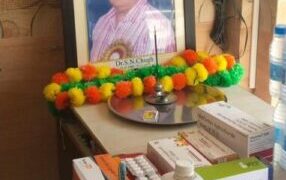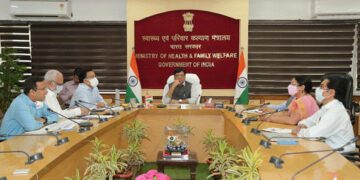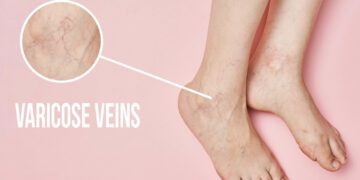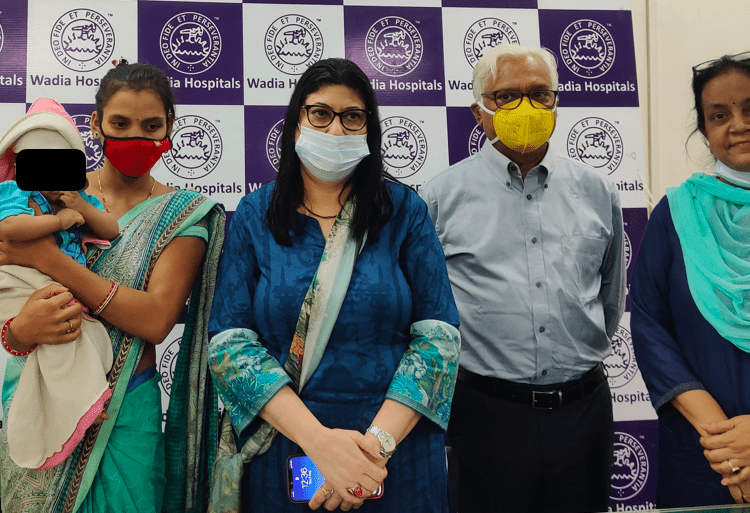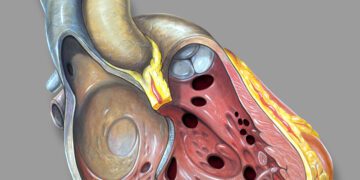By Health In Five Writer
A team of doctors at Wadia Hospital performed a successful complex 8-hour brain surgery on a 4-month old boy with rare congenital encephalocele disorder wherein the bones of a baby’s skull fail to close completely in the mother’s uterus, and gave him a new face and life.
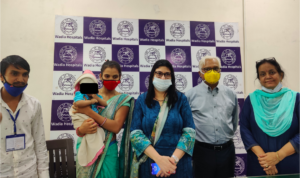
The couple Suresh Kuta Pavra and Bhartibai Suresh Pavra, the residents of Dhanaji Putro village, Nandurbar, Maharashtra became proud parents of a third baby boy Kartik this April after Ayush and Hardik. But, their happiness was short-lived when they saw a huge swelling on the face of the little baby, a swelling which hung over his eyes and almost blocked his nose when they saw the baby for the first time. This made it difficult for the baby to eat, breathe and his vision was distorted. Back there in the village, the doctors and nurses referred the family to a local hospital in Taloda, Nandurbar. Then, their trips to the hospital continued for a month. Even after performing CT scans, no one had any clue regarding the condition he suffered from, and the family was told that the patient can get operated on in the near future. Finally, the village primary health care provider sent the pictures to the paediatric neurosurgeon at Wadia Hospital and after six days, the family took the bold step to move the child to Mumbai in midst of Corona, with fear in the heart and little Karthik in hands. Little did they know about the war-like readiness done by the team at Wadia Children’s Hospital to receive this baby of courage. The neurosurgery teamed up with the craniofacial plastic surgery team to save the baby’s life.
Dr Chandrashekhar Deopujari, an honorary neurosurgeon at Wadia Hospital, said, “On arrival, the baby was diagnosed with a massive frontonasal encephalocele with his brain pouting in between his nose and eyes as it is linked to craniofacial deformity. This rare condition made the baby’s brain grow down via a crack in the skull into his nose. Encephaloceles are characterized by protrusion of nervous tissue through the skull base openings into either the face or the posterior part of the skull. Encephalocele incidence is around 1 in 10,000 live births. The incidence is higher in India as compared to the western world due to lack of adequate folic acid ingestion or genetic causes. The child’s brain had descended down like a pouch and the bone between his brain and the eye was deficient. Along with his brain, his brain fluid space (ventricle) and his brain artery (Anterior cerebral artery) were in the encephalocele. Even though there was no impact on his brain activity. The child was breathing through his mouth because the swelling had prevented him from breathing properly through his nose; his vision was impaired and had completely deformed his nose and face. Having taken care of his massive encephalocele impending rupture, at a mere age of 4 months age, with the brain fluid space (ventricle) and blood vessel (anterior cerebral artery) being within the sac, was the challenge. Thus, by adhering to the Covid protocol, the child was worked up in a prompt and planned manner.”
Dr Deopujari added, “The craniotomy procedure was scheduled on July 22, 2021, and his skull was opened and retracted his brain back. The normal brain from the sac of non-functioning brain matter was isolated that hung from his face. Later, an artificial bone was placed between the two eyes and another bone on that to ensure that the brain does not fall again into the nasal cavity. The 8-hour surgery was uneventful, he was kept in the ICU for 2 days and later shifted to the normal ward. Delay in treatment would have leaked brain fluid from this swelling, would have a threatening infection of the brain and brain covering looming over him. In small children, additional bone can have disfigurement of the skull. This baby will need another open surgery after he turns 4 to set a bone jaw. The incidence of these neurological defects can be greatly reduced by taking folic acid tablet which us a vitamin tablet 1 month prior to planning pregnancy and 2 months after conception.”
“The surgery was complicated, but, we trusted the doctors and handed our child to them. I thank Wadia Hospital for saving my baby and for giving us that much-needed relief from the tragic ordeal. I am a farmer and the sole breadwinner of the family. We live from hand to mouth. I thank each and everyone who came forward and contributed to funding the surgery”, said the baby’s father Suresh Pavra.
“Manned by the neurosurgery, plastic surgery team and backed by their excellent anesthesia, nursing, and the IPCU team, the surgery was a huge success. Just like every day, the entire medical team at Wadia Hospitals today is proud to give a new face, a new life to yet another small baby”, concluded Dr Minnie Bodhanwala, CEO of Wadia Hospital.
Follow Health In Five on LinkedIn, Facebook, Twitter & Instagram
Subscribe on WhatsApp & Telegram to receive real time updates




